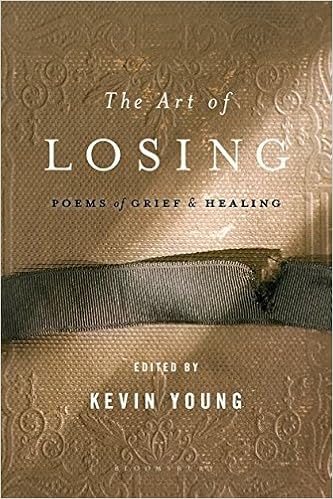Eileen made it safely to Elizabeth’s house in China. I miss her, but she looks like she’s having fun. I am easing into solitude. I think I might a poetry addict. When I consider that I usually read a couple of poems lying in bed in the dark most mornings, I am reminded of alcoholics (an Anthony Burgess character in particular) who set their alarm in the early hours so that they can down a beer before they have to get up.
I have been trying a couple of web sites that post a daily poem: Poem A Day -Academy of American Poets and Poetry Daily: today’s poem. But the poems they put up haven’t really grabbed me. Not that the defunct Garrison Keillor’s Writer’s Almanac always had great poems. But there was always a chance it would be good one. I do have many anthologies on my tablet which have some very fine poems.
Kevin Young, the new poetry editor of The New Yorker, has done some pretty cool collections. At least I am enjoying (in my perverse way) The Art of Losing: Poems of Grief and Healing.

Lots of good poems in this book. Few duds. Young included Dylan Thomas’s “Do not go gentle into that good night”early in this collection. I’m about half way through the book. I was gratified that he also included Thomas’s “A Refusal to Mourn the Death, by Fire, of a Child in London.” I’ve always liked that poem a lot.
The cool things is that the poem after it, “Luke and the Duct Tape” by Coleman Barks, after getting started with some stuff about the dead dude (all of the poems are about death) positions itself in dialogue with the Dylan Thomas poem.
Here it is, if you’re curious. I guess it’s kind of long.
LUKE AND THE DUCT TAPE
by Coleman Barks
Nothing can save us. This sweetness dies and rots.
Luke was a thirty-year old pharmacy graduate
student who worked at Horton-Add Drugs,
at the post office in the back
that stays open until seven p.m., my p.o.
It was also a lunch counter.
He sometimes did things behind there,
like make me a tuna fish sandwich
and fill a glass with ice and diet coke.
He mopped the place and swept up,
as quick and accurate with the broom-jabs
as he was at calculating my strange Tasmanian mail.
Hey, Finland! Once I sent out seventy-four books
priority mail. He said, It looked like Christmas
back there. In the storeroom where
the mailman picks up.
He laughed so easily with his quiet industry,
something out of Norman Rockwell.
He’s maybe the most promising thing we are,
Luke, young American man just before
he meets a woman and raises a family
and does church group and little league,
and every good thing stored in his strong hands
comes building out into the air.
Luke, master of small fixing.
Now on the glass double door, this handwritten
posterboard for his memorial service.
11 a.m. today. I missed it.
Would I have gone? Luke Poucher.
I never knew a last name.
One day we had some talk about how he knew
my name from all the mail, but I didn’t know
his. Luke. That’s a great name.
He was killed instantly last Thursday
in an automobile accident down the street
on Lumpkin at Old Princeton Road,
where he lived, not a half mile from me,
not a week ago. I had not heard
and don’t now ask the Horton family for details.
Car wreck. Luke’s dead. Luke 17:12.
The kingdom of God is within you.
He was so lightheartedly that,
it took your breath.
Is it with his death I fear my own
before the loving here gets as open
as it might could get in such as me?
I feel myself becoming arrogant sometimes
and a little numb, insensitive, with this
famousness I’ve been absorbing
the last few years.
I do not understand Dylan Thomas’ “Refusal
to Mourn the Death of a Child
by Fire in London.”
After the first death, there is no other,
he concludes, but on what authority?
He pictures his own death as entering
again the round Zion of the water bead…
the synagogue of the ear of corn,
and I have loved those words
since I first heard them in 1957.
I see the holy, tiny, elemental
corridors of corn grains and the fragile
tearshape inside the word Zion.
He says the nameless girl who burned
to death is now with the robed dead
by the unmourning Thames.
It may be that Luke is off somewhere profound
and myriad, though I feel him close
and still-mortal as I write this, waiting
for the foolish satisfaction
of my own phrasing.
What is the sudden subtraction of a young man,
who might just as well be my son,
a filament of ocean beauty
I do and don’t see today, do.
I grieve the death of Luke Poucher
for the place he swept and tended so well,
this fivepointed threshing floor
of stores and walkers and apartments,
mailmen, depositors, lunching retiree,
chemo-waver, body-worker, skateboarder,
UPS, any bunch that knows each other’s
half-grin in hurried irritation
out doing errands.
Let this be Luke, this end of the parking lot
around the mailboxes, Luke Poucher Place.
The air, the few flowers,
and the people as they meet going in
to buy lunch or stamps or shampoo,
their small nods of helplessness.
I asked for duct tape once.
You know, we ought to carry that,
but we don’t. It’s about all I know
how to do to fix anything.
I’ve got some broken ducks.
I need to get them in a row.
Let this low talking, the love and joking
we do fumbling for courtesy
here at this door be Luke, Luke
looking up from the stroke
of his all-hallowing broom, Beautiful
out there, isn’t it?
————————————–
I found a video of Barks reading it, but for some reason he left out the Dylan Thomas part. Also, it looks like Barks released some sort of recording of himself reading it with sort of new agey music in the background. I opted to just put the poem here so you could read it.
We’re still working the bugs out of the new organ at church. The lowest pipe keeps sticking. It’s not as bad as it was last week. Ron Brown knows how to adjust it. He and I are meeting this morning after the 9:30 Eucharist so that I can hold notes for him while he adjusts it.
Originally, he had texted me to meet at 9:30. This morning he suggested 10:30 instead. This extra hour gives me some time I can use. I’m blogging now because I was expecting to have to leave the house pretty soon and walk to church (car still in the shop).
I hope I’m settling into a bit of a life of the hermit. I am behind in composing a piece for my friend Rhonda. I have worked on it, but it’s still in early stages. This morning my head cleared a bit and I did some more on it. That poetry in the morning helps me get me going.
I hesitate to talk too much about the composing. It seems to often short circuit the work if I don’t keep it inside me for a while.
I was hoping to get working on it yesterday or even Monday. But it just wasn’t happening. I have the discipline to sit down and work no matter what. But. I also have the self understanding that I might as well wait for the real thing if indeed it comes.
Solitude helps this process. Or at least it has helped me before.
